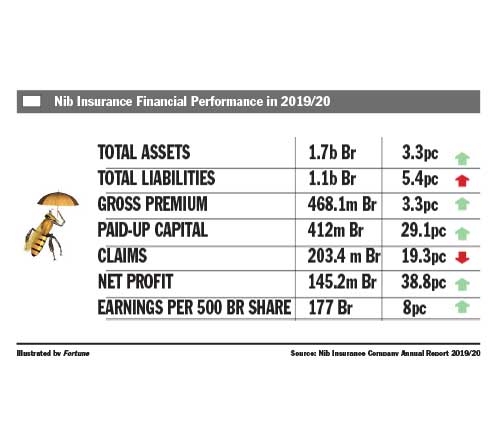
Fortune News | Oct 30,2021
Apr 30 , 2021
By Asseged G. Medhin
In the face of challenging economic times, pressing regulatory changes, and increased competition for market share, insurance companies struggle to maintain their balance. Emerging human-made risks are streaming into the sector on one hand while there are ever-increasing economic, human power and technological challenges on the other.
The competitive landscape is shifting and will favour those in the insurance industry that take advantage of today’s market to position themselves long-term. Capitalising on the current challenges and turning them into real opportunities will require new strategies that leverage talent and increase productivity.
The regulatory body’s, the National Bank of Ethiopia (NBE), dynamic move and breakthrough in issuing directives that will challenge the financial sector’s role in the economy is a remarkable one. It moves the country towards a robust financial sector with clout on the regional and continental stages. Part of these changes is raising minimum paid-up capital for banks to five billion Birr, although it remains at 75 million Br for insurance firms. Indeed, as the central bank seems to have understood, it is unsustainable to continue to have analogue services and expect improved performance over time.
The central bank's decision is crucial to protect existing and forthcoming bankers and insurers from foreign financial institutions. Adequacy of capital and risk regulation is a significant part of this. Unfortunately, the minimum requirement for insurers remains extremely low and it has to be increased as the economy expands.
Leaders in the financial sector have a great deal to answer for when it comes to the state of the financial sector as well. Nepotism and favouritism are rife, and those that come with new practices are often seen with suspicion. Their focus is nearly entirely local though most include “international” in their name.
We insurers need to support the initiative to minimise the risk of failure from manual processes and maximise customer retention, underwriting effectiveness, customer service response, and human capital investment. We should come out from our shell and challenge the status quo rather than seek traditional responses from the shareholders and the central bank.
It should be kept in mind that the Ethiopian insurance sector has always been a highly regulated industry. New regulations and legislation are proposed and adopted on a regular basis. In some cases, when the sector faces some emerging risks and ill practices, the regulatory bodies issue directives. Many of these directives are directly related to operational, financial and marketing business processes.
For traditionalists, this is a challenge. But the regulatory body is doing its assignment to ready the financial sector for a changing economic environment that may, in time, see foreign firms joining.
Insurance companies that understand the truly compelling need for this transformation and have adopted the tools available today to increase operational efficiency and improve critical insurance processes will be leaders in the industry for years to come. We need change in the existing insurance and bank practices, and should favour the regulator’s decision, because of the explicit need to survive and grow. No more, no less. The financial sector is not operating proactively with regard to mitigating risks arising out of the impacts of directives and business dynamics and capitalisation on human capital.
Some changes need to be made by the regulators as well, nonetheless. For instance, it would be fruitful to hold discussions with stakeholders when putting in place directives such as the raising of minimum capital requirement. It gives the central bank more consistency and predictability, which is critical for long-term planning by insurers and banks.
There is undeniable momentum for the financial sector to grow. The leaders in the sector need to realise this and mobilise opportunities to transcend risks and grow further.
PUBLISHED ON
Apr 30,2021 [ VOL
22 , NO
1096]


Fortune News | Oct 30,2021

Radar | Nov 16,2019

Advertorials | Oct 10,2019

Radar | Sep 14,2025

Commentaries | Dec 29,2018

Fortune News | Jul 06,2025

Fortune News | Feb 20,2021

Exclusive Interviews | Jan 05,2020

Editorial | May 21,2022

Fortune News | Jul 06,2019

Photo Gallery | 175106 Views | May 06,2019

Photo Gallery | 165331 Views | Apr 26,2019

Photo Gallery | 155621 Views | Oct 06,2021

My Opinion | 136774 Views | Aug 14,2021

Dec 22 , 2024 . By TIZITA SHEWAFERAW
Charged with transforming colossal state-owned enterprises into modern and competitiv...

Aug 18 , 2024 . By AKSAH ITALO
Although predictable Yonas Zerihun's job in the ride-hailing service is not immune to...

Jul 28 , 2024 . By TIZITA SHEWAFERAW
Unhabitual, perhaps too many, Samuel Gebreyohannes, 38, used to occasionally enjoy a couple of beers at breakfast. However, he recently swit...

Jul 13 , 2024 . By AKSAH ITALO
Investors who rely on tractors, trucks, and field vehicles for commuting, transporting commodities, and f...

Oct 18 , 2025
The political establishment, notably the ruling party and its top brass, has become p...

Oct 11 , 2025
Ladislas Farago, a roving Associated Press (AP) correspondent, arrived in Ethiopia in...

Oct 4 , 2025
Eyob Tekalegn (PhD) had been in the Governor's chair for only weeks when, on Septembe...

Sep 27 , 2025
Four years into an experiment with “shock therapy” in education, the national moo...

Oct 18 , 2025 . By NAHOM AYELE
In a sweeping reform that upends nearly a decade of uniform health insurance contribu...

Oct 18 , 2025 . By BEZAWIT HULUAGER
A bill that could transform the nutritional state sits in a limbo, even as the countr...

Oct 18 , 2025 . By SURAFEL MULUGETA
A long-planned directive to curb carbon emissions from fossil-fuel-powered vehicles h...

Oct 18 , 2025 . By BEZAWIT HULUAGER
Transaction advisors working with companies that hold over a quarter of a billion Bir...